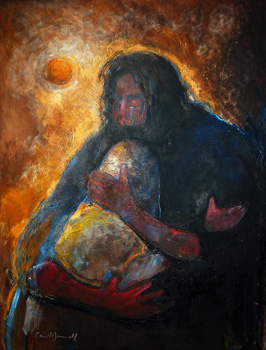For Sunday October 25, 2020
Lectionary Readings (Revised Common Lectionary, Year A)
Leviticus 19:1-2, 15-18
Psalm 1
I Thessalonians 2:1-8
Matthew 22:34-46
I believe it’s my generation that ruined the word “awesome.” I was in college when the adjective went viral and everything became “awesome.” Friday night’s pizza party. The guest professor’s Shakespeare lecture. My roommate’s new haircut. Ice cream.
It didn’t take long for the once-rich and evocative word to deflate. Nowadays, few people hear the word “awesome” and feel the spine-tingling sense of wonder, apprehension, surprise, and astonishment the word is supposed to inspire. “Awesome” has become a dull word. Sort of like “nice.” Or “cool.”
As a Christian, I fear that the same might be said of another word — a word central to the faith, a word Jesus himself used to sum up the whole of his identity and mission. A word upon which, he said, “hang all the law and the prophets.” What’s the word? Love. The word is love.
In our lectionary reading from Matthew’s Gospel this week, the Pharisees ask Jesus yet another “test” question: “Which commandment in the law is the greatest?” Jesus answers without a moment’s hesitation: “‘You shall love the Lord your God with all your heart, and with all your soul, and with all our mind.’ This is the greatest and first commandment. And a second is like it: ‘You shall love your neighbor as yourself.’”
Love God. Love your neighbor. On these two commandments hang everything else that matters in this world. Period.
 |
May I take a moment here to point out what Jesus doesn’t say in response to the Pharisees’ question? Remember, at this point in the story, Jesus’s crucifixion is just days away. Death is literally breathing down his neck, and he is rapidly running out of opportunities to communicate the heart of his message. But when he is asked what matters most in a life of faith, Jesus doesn’t say, “Believe the right things.” He doesn’t say, “Maintain personal and doctrinal purity.” He doesn’t say, “Worship like this or attend a church like that.” He doesn’t even say, “Read your Bible,” or “Pray every day,” or “Preach the Gospel to every living creature.” He says, “Love.” That’s it. All of Christianity distilled down to its essence so that maybe we’ll pause long enough to hear it. Love. Love God and love your neighbor.
Okay. But what does it mean to do this? How are we to love? This is where, I fear, our overuse, misuse, and even abuse of the word “love” gets us into trouble. We claim to “love” many things. We “love” our favorite celebrities, movies, bands, and television shows. We “love” going on vacation, or reading a well-crafted novel, or watching our favorite team play football. We “love” chocolate or bacon or sushi or chicken tikka masala.
In other words, shaped as we are by Hollywood, romance novels, contemporary praise and worship music, and tabloid magazines, we tend to think of love as a feeling. A spontaneous and free-flowing feeling that arises out of our own enjoyment, our own sense of kinship and affinity. We don’t think of it as discipline, as practice, as exercise, as effort. We fall in love. We insist that love is blind, that it happens at first sight, that it breaks our hearts, and that its course never runs smooth. We talk and think about love as if we have little power or agency in its presence.
But this is not how the Bible describes love. Jesus doesn’t say, "I sure hope love happens to you.” He says, “Love is the greatest and first commandment.” Meaning, it’s not a matter of personal affinity, feeling, or preference. It’s not a matter of lucky accident. It’s a matter of obedience to the one we call “Lord.”
When I look at my own life, it’s not too hard to name why I perpetually fail to obey the greatest commandments. Biblical love is vulnerable-making, and I’d rather not be vulnerable. Love requires trust, and I’m naturally suspicious. Love spills over margins and boundaries, and I feel safer and holier policing my borders. Love takes time, effort, discipline, and transformation, and I am just so darned busy.
What would it cost us to take Jesus’s version of love seriously? To practice and cultivate a depth of compassion that’s gut-punching? To train ourselves into a hunger for justice so fierce and so urgent that we rearrange our lives in order to pursue it? To pray for the kind of empathy that causes our hearts to break? Do we even want to?
 |
Most of the time — I’ll be honest — I don’t. I want to be safe. I want to keep my circle small and manageable. And I want to choose the people I love based on my own affinities and preferences — not on Jesus’s all-inclusive commandments. Charitable actions are easy. But cultivating my heart? Preparing and pruning it to love? Becoming vulnerable in authentic ways to the world’s pain? Those things are hard. Hard and costly.
And yet this is the call. Which means that we have a God who first and foremost wants our love — not our fear, penitence, or piety. And we have a God who wants every one of God’s children to also feel loved. By us. Not shamed. Not punished. Not chastised. Not judged. But loved.
I don’t think it’s a coincidence or a mistake that Jesus inextricably links love of God with love of neighbor. Each reinforces, reinterprets, and revives the other. As heirs of the Incarnation, we cannot love God while we refuse to love what God loves. We cannot love God in a disinfected, disembodied way that doesn’t touch the dirt and depth of this world. Our love is meant to be robust and muscular, hands-on and intimate. Reaching into skin and bone and blood and tears.
Neither can we love ourselves or our neighbors in any meaningful, sustainable way if that love is not sourced and replenished in an abiding love for God. Only God's love is inexhaustible; if we cut ourselves off from the flow of God's compassion, we will quickly run dry. In other words, the motion of our hearts must be cyclical — love of God making possible and deepening our love of neighbor, and love of neighbor putting flesh and bones on our love for God.
In his beautiful commentary on this Gospel, Lutheran minister Clayton Schmit writes this: “To love God with all our heart, mind, and soul seems nearly impossible when we think of love as an emotion. How does one conjure up feelings for something as remote, mysterious, and disembodied as the concept of God? We cannot look into God's eyes, wrap our arms around the Spirit, or even see the face of Jesus.
“Likewise, loving our neighbor is difficult. If love is merely our passive response to the person next to us, we are likely to be more often repulsed than moved to love. How can one legitimately look into the face of an enemy and feel unqualified love? It is nearly impossible.
“But biblical love is not passive. It is not something that occurs to us without our control or will. Biblical love is something we do.”
 |
So what is it that we are commanded to do? I believe the call is to follow in the footsteps of the one who stood in the presence of his accusers and enemies, and declared love the be-all and end-all. The call is to weep with those who weep. To laugh with those who laugh. To touch the untouchables, feed the hungry, welcome the children, release the captives, forgive the sinners, confront the oppressors, comfort the oppressed, wash each other’s feet, hold each other close, and tell each other the truth. The call is to guide each other home.
In the church I attend, we’ve been ending our Evening Prayer liturgy on Sundays with a blessing from A Black Rock Prayer Book. It leaves me teary-eyed every time I hear it, so I’d like to share it with you in closing:
The world now is too dangerous and too beautiful
for anything but love.
May your eyes be so blessed you see God in everyone.
Your ears, so you hear the cry of the poor.
May your hands be so blessed
that everything you touch is a sacrament.
Your lips, so you speak nothing but the truth with love.
May your feet be so blessed you run to those who need you.
And may your heart be so opened, so set on fire,
that your love, your love, changes everything.
And may the blessing of the God who created you, loves you,
and sustains you, be with you now and always.
May it be so.
Debie Thomas: debie.thomas1@gmail.com
Image credits: (1) Faith & Leadership; (2) Fine Art America; and (3) Fine Art America.



